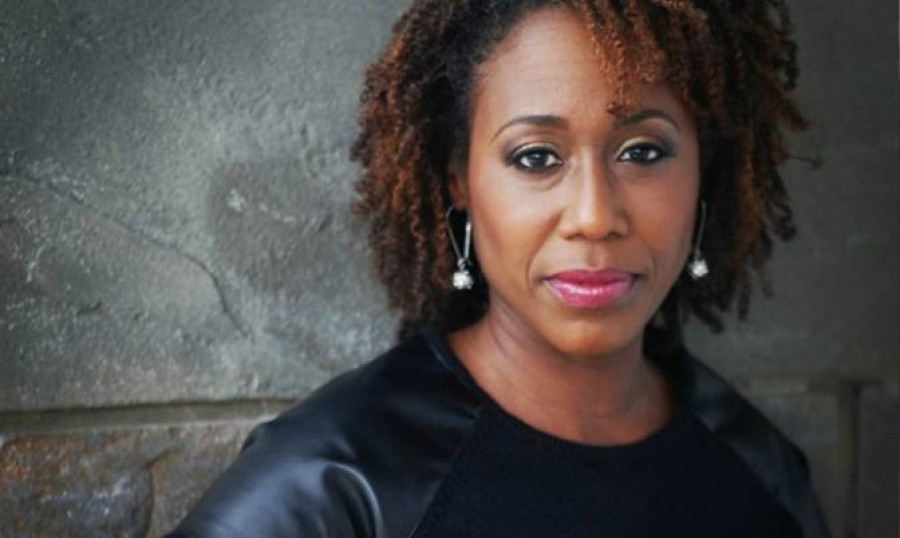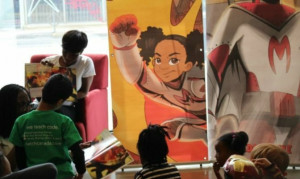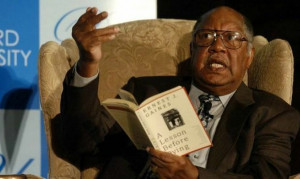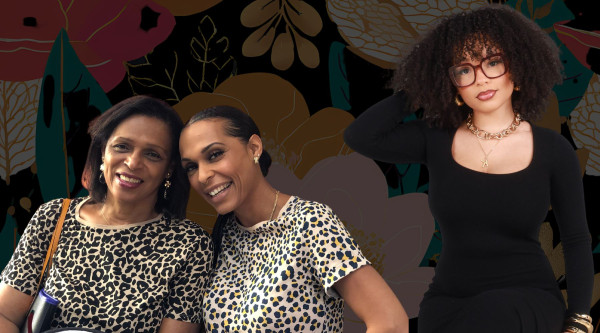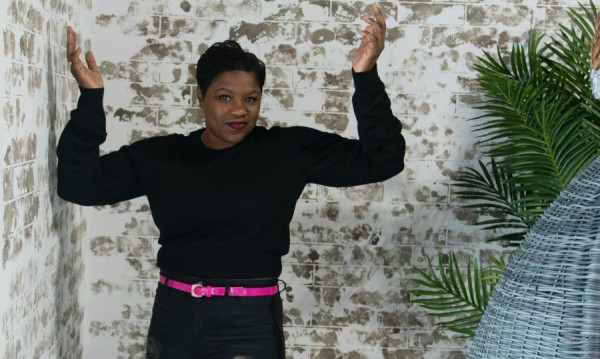It’s not a book that tells you how to do your hair but a collective of stories from 32 men and women who have embraced their natural tresses. Including some who are not strangers to the spotlight like Hollywood actress Kim Coles, Nicole Ari Parker and the late poet and author Dr. Maya Angelou. With over 25 years of experience as a writer, media specialist, and editorial coach Michele’s aim is to help identify and encourage people to be the best version of themselves revealing certain issues that hinder self-love and self-acceptance.
What was the inspiration behind the title “Hairlooms”?
The inspiration comes from my own journey. I noticed that words really shaped how I felt about myself. Negative words followed me along my natural hair journey like when someone would say, “You messed up your hair because you cut it” or being called “blacky.” Much like an heirloom in the traditional sense, like passing on a family recipe or certain code words or traits. It’s a play on word and with the title “Hairlooms” I wanted to remind people that the words that you pass along in your circle do not have to be negative. We should have an intentionality to our words and more positives and empowering words that are affirming when we speak about natural hair and beauty.
What inspired you to write this book?
About 8 years ago my husband and I were trying to have children. At the time I thought the healthiest thing for me would be to stop perming my hair because I did not want that chemical in my bloodstream. While I was dealing with issues of failed adoption and fertility I realized I wasn’t feeling great about myself because my hair wasn’t straight or my edges weren’t laid. That got me thinking about how I really felt about my natural hair and beauty. I remember when I had a speaking engagement, I was natural and my hair was flat ironed. I could feel my hair curling up and I was like “I am not doing this anymore!” These are some of the instances that inspired me to wear my hair in its natural state. As I was going through my journey a lot of women would come up to me, telling me stories of hair loss and how they were concerned that men wouldn’t like them. I believe this led to my Aha moment or epiphany in September 2010 and that’s when I started writing “Hairlooms.” I think it's interesting as storytellers to have as many aspects or sides of the story as possible. It's something like a diamond - diamonds are more brilliant based on the number of facets and sides they possess. It’s the same thing with a story. Variety is a spice of life and with a variety of nuances and perspectives, the reader's experience is enhanced.
There are 32 stories in your book, how did you decide on which stories to include?
I wanted to touch on different aspects that play a role in black women loving their hair. For instance, if someone has low self-esteem there are behaviours that are linked to the belief or lie “I am not beautiful.” Oftentimes you’ll hear it echoing from women who wear their hair straight, “I’m not going to exercise because I just spent $150 on a perm.” What this means is that health challenges increase. Which then eats at other parts of our lives, which tends to be fitness.
Black women spend an inordinate amount of money on hair care. Statistics show that black women spend three times more money than their white counterpart on hair and beauty products. I’m not an opponent of spending money but when does it cross the line from being natural maintenance to feeding an unhealthy issue? In the book I talk about “chasing the phantom”. The phantom is the look that we’re going after and no matter how much we put in our hair or skin lighteners we cannot change permanently what God has created.
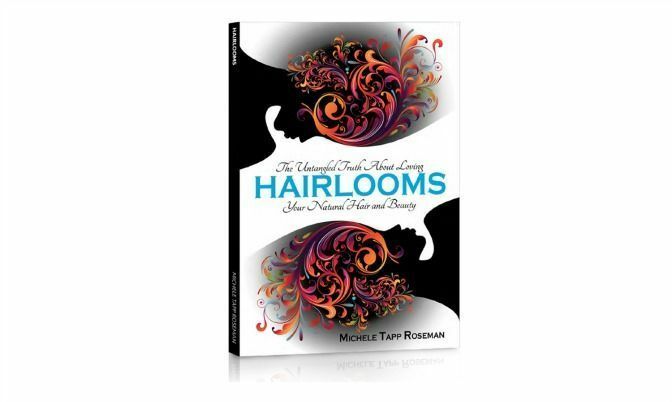
Would you encourage women of other ethnicities to read your book?
Definitely! I love to say that “Hairlooms” is a bridge builder. It’s been interesting because I’ve been getting a lot of robust feedback from women who are not black. I believe that the stories have a common thread throughout and there are places where people can insert their own experiences and they can draw fresh water and fresh insights. I also think that it’s great for folks to read it regardless of their background because we live in a global world. Sometimes in order to have healthy relationships, we need a bridge builder like “Hairlooms” to highlight and amplify different experiences.
How do you think men would benefit from reading your book?
Men don’t always understand the depth of pain that women experience surrounding hair so anything that open their eyes for healthier relationships is a definite plus. Men can also be a source of providing positive affirmations and instilling a sense of self-worth. I think it would be a great read for men! Healing takes place in phases and stages and what I call “healing helpers” much like physicians and nurses have different roles in enhancing the experience of a patient. Men can play that role.
Do you feel there was a lack of knowledge about natural hair say 5 or 10 years ago? Would you say that has changed?
I think people are becoming more aware of some of the challenges that people have as it relates to women accepting their natural hair. There was a study that came out a few months ago showing that people who are not black take issue with natural hair. I think now you have more studies that bring awareness on these issues. Naturally textured hair is not seen as equal across the board. A book like “Hairlooms” helps women pass along positive words of natural hair and beauty. You can’t change the external dialogue but you are responsible for the internal dialogue racing inside. If your reservoir of hairlooms is filled with empowering words then you can override anything externally.
What would you say was the biggest challenge for the women you interviewed?
The common thread I noted is that nothing can be used as a substitute for self-love. Some of the women and men in the book are accomplished or may look great on paper but when you see them in front of the camera their inner world is not in a good place. One woman in particular that I interviewed, she was beautiful and I remember telling her how pretty she was, she said “really? I just don’t feel it.” As a wealth expert she has traveled all over the place, taught people how to manage money yet there’s something nagging inside. On the other hand when I spoke to Dr. Maya Angelou she showed tremendous love for herself. When the internal life is okay then the external life ends up being an enhancement. Interviewee Deborah Owens says in the book “we can’t change what we won’t acknowledge.” As women, it’s important to stop fighting and listen to that voice on the inside.
Is it possible for women to feel truly confident and accept their natural hair in the corporate world?
Sure it is! It would take some work just like with anything. It’s funny, I was on a Skype call for a conference a couple weeks ago and someone posed a similar question and I gave some tips. I’m a big fan of research to find out how women are wearing their hair. What is acceptable? What is deemed unacceptable? Then choose and pick your battles. If there is no issue of wearing your natural hair then you have to do the self-work and let yourself know that you are beautiful. Select a style that is appropriate whether it’s being straight or in its natural state. If you go down the road where there has to be a legal battle and you are excellent at your job then you have a case. If your work is poor it does not matter if your hair is bone straight. Make sure your work is flawless. Do it so well that hair is secondary because all they want is you as a person.
Give us one reason why someone/anyone should purchase your book? What will he/she gain?
I believe it’s an ache in all people to be the best they can be. We don’t live on an island, we live in a community and if you want to be the best that you can be you need to one, relate to yourself if you’re a black woman in a way that’s healthy. If you’re not black you want to be able to intelligently work in the community with other folks. By maximizing your self-awareness or maximizing the awareness of others around you, you become the best version of yourself.
For the black women with Afro-textured hair it’s time to heal and for those who are healed pass the torch to somebody else, take it to another level. Regardless of where you are on the spectrum you definitely want to get “Hairlooms!”
What’s next for you?
I plan to continue to share the message of “Hairlooms” around the world. I’d love to be featured as a speaker for conferences and really allow folks to hear more of my story and also to hear more of their stories. I think it would be neat to have storytelling events, conferences where you can convene and share stories. This is where healing can really take place. I really want to spread the message telling women that you are enough and that passing along positive words when you speak about hair and beauty will shape how you feel about yourself and how the world around you also feels and relates to you.
